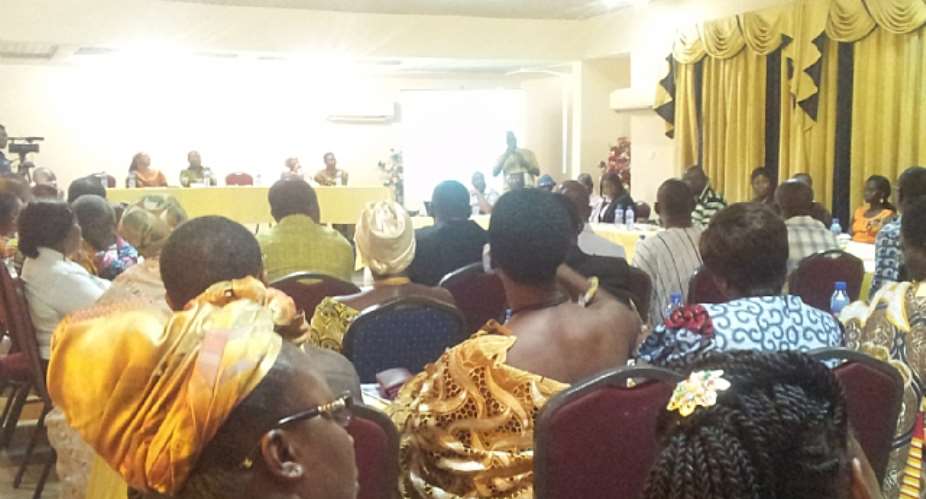WaterAid Ghana in partnership with the Resource Centre Network (RCN) Ghana, in collaboration with the MWRWH/MLGRD has held a sanitation workshop on the theme 'The Current National Sanitation Challenges and the potential role of Endogenous Development Approach (ED) in Ghana.'
The workshop which took place at the Erata Hotel on 22nd July, 2014 in Accra was aimed at raising awareness on African Indigenous sciences and the potential for endogenous development. It was also a platform to also introduce 'Endogenous development' as an alternative path and strength based approach that involves interfacing indigenous and western knowledge and resources for holistic development. The workshop was attended by stakeholders and Queen Mothers from all ten regions of the country.
In his presentation, the head of Policy and Partnership, WaterAid Ghana, Mr Ibrahim Musa said sanitation issues are of utmost concern to everybody. He therefore called on participants to look at communities and their culture and wisdom as rich resources for generating dialogue and action for positive change: whether in environmental protection, peace building, food security, health, agriculture, governance or community water, sanitation and hygiene initiatives.
Mr Musa said many communities in Ghana especially the rural poor, depend on streams and swamps, which dry up during severe droughts as a result of recent climate change. Floods overwhelm existing systems, contaminating drinking water and creating sewerage overflows. Salt-water intrusion along coastal communities without centralised water systems deprives communities of potable water for domestic and industrial use.
He said industrial activities can be a significant cause of poor water quality. For instance, small artisanal gold mining operations called 'Galamsey' operate around or in river beds, polluting and sometimes diverting the rivers, greatly affecting water supplies to some communities in the process. He advised the public to be cautious of activities that poses a threat to their health and that of others.
The Executive Director for Centre for Indigenous Knowledge and Organizational Development (CIKOD), Mr Bern Guri, in his presentation, also said it is important for stakeholders to continuously engage their communities and themselves to ensure proper sanitary conditions all over the country. He explained that the Endogenous Development (ED) approach was a way by which individuals or communities mobilize and utilize their local resources, knowledge and institution to work towards achieving this goal.
However, some forces undermining the ED is modernization, religion and request for quick results. He advised that the public need to be weary of technological advancement which sometimes creates undermines our culture and values as a nation.
Mr Guri therefore called on the public especially chiefs and Queen Mothers to educate their communities on ways that will help them achieve the set goal- thus, improving sanitation in Ghana. He said they should learn innovative strategies for including culture, local and indigenous knowledge and African worldviews in development planning. Gain critical appreciation of strength-based approaches to community development and create a better understanding on the value of culture for development.
He also added that in view of the ongoing challenges to the provision of clean safe water, sanitation, and hygiene (WASH) nationally (especially sanitation); WaterAid Ghana (WAG) country programme seeks innovative means to design appropriate strategies and approaches that would contribute to addressing WASH challenges. The Endogenous Development (ED) approach provides an alternative solution to the ever increasing challenge of achieving transformational change towards sustainable development not only in the WASH sector but broader human development.
 C360 2014-07-22-11-27-29-611 ORG
C360 2014-07-22-11-27-29-611 ORG
 C360 2014-07-22-11-27-47-087 ORG
C360 2014-07-22-11-27-47-087 ORG





 Akufo-Addo commissions Phase II of Kaleo solar power plant
Akufo-Addo commissions Phase II of Kaleo solar power plant
 NDC panics over Bawumia’s visit to Pope Francis
NDC panics over Bawumia’s visit to Pope Francis
 EC blasts Mahama over “false” claims on recruitment of Returning Officers
EC blasts Mahama over “false” claims on recruitment of Returning Officers
 Lands Minister gives ultimatum to Future Global Resources to revamp Prestea/Bogo...
Lands Minister gives ultimatum to Future Global Resources to revamp Prestea/Bogo...
 Wa Naa appeals to Akufo-Addo to audit state lands in Wa
Wa Naa appeals to Akufo-Addo to audit state lands in Wa
 Prof Opoku-Agyemang misunderstood Bawumia’s ‘driver mate’ analogy – Miracles Abo...
Prof Opoku-Agyemang misunderstood Bawumia’s ‘driver mate’ analogy – Miracles Abo...
 EU confident Ghana will not sign Anti-LGBTQI Bill
EU confident Ghana will not sign Anti-LGBTQI Bill
 Suspend implementation of Planting for Food and Jobs for 2024 - Stakeholders
Suspend implementation of Planting for Food and Jobs for 2024 - Stakeholders
 Tema West Municipal Assembly gets Ghana's First Female Aircraft Marshaller as ne...
Tema West Municipal Assembly gets Ghana's First Female Aircraft Marshaller as ne...
 Dumsor is affecting us double, release timetable – Disability Federation to ECG
Dumsor is affecting us double, release timetable – Disability Federation to ECG
